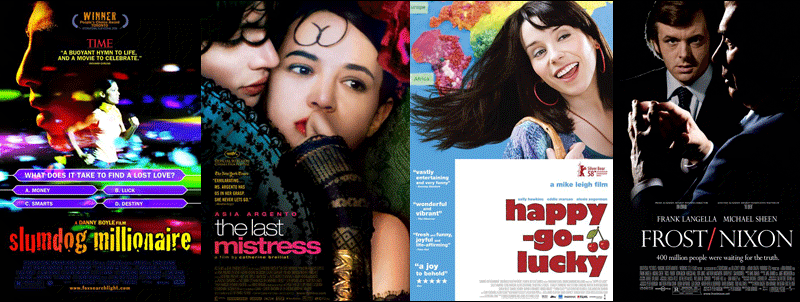“Push”-Filmed in the streets of Hong Kong, “Push” is a sci-fi film which imagines that the human race contains groups of people with unusual powers who are fighting each other as well as a government agency called “the Division.” There appear to be four primary types: sniffers, who can gain insight into people and events by, well, sniffing things; watchers, who see the future and draw pictures of it; movers, who can mentally move things around; and pushers, who can control other people’s minds. Led by pusher Henry Carver (Djimon Hounsou), the Division is dominant, but its true goals are never made clear, while the film centers around its attempt to find both a young woman, Kira Hollis (Camilla Belle), who has escaped from a Division facility after surviving the application of a special drug, and a case containing that drug. Chris Evans is our hero, Nick Gant, a mover, who, with the help of 13-year old Cassie Holmes (Dakota Fanning), a watcher, attempts to defeat not only the Division, but also a local Asian gang, trying desperately to use their powers to find the case and its contents. Strangely, the Asian gang seems to be the only group to include a fifth class of special people, the “yellers” (?), people who can scream so loud that everything, including people, will break. Although the premise is clever, and the film benefits by having been made in the exotic locale of Hong Kong, it falters for a variety of reasons, including the fact that the plot trips all over itself due to inconsistencies in logic. At one point, for example, Nick writes instructions to each member of his group explaining what they must do at a particular moment in the future. Since he’s a mover and not a watcher, it’s unclear how he is able to give each member of his group just the right written instructions for the just the right moment. But the biggest weakness in “Push” is its cast. Chris Evans is pleasant and generically handsome, but lacks the star power and charisma that might have pushed this film over the top into success. Dakota Fanning is, as usual, charming and effective as the watcher Cassie, worried about what she is seeing in her future. But the character at the heart of the story, Kira, is played by the lifeless Camilla Belle. Ms. Belle is generally expressionless, and although she and Nick are supposedly lovers, there is zero chemistry between her and Chris Evans. With a first-rate cast and a really good writer who could have scripted a more original and insightful sci-fi plot, a la “Blade Runner,” “Push” could have been something special. Instead, it left me cold. C+ (7/31/09) “Anita O’Day: The Life of a Jazz Singer”-Since I’m very interested in jazz vocals, it surprised me how little I knew about Anita O’Day, considered one of the finest jazz vocalists of the 20th Century. And I venture to guess that if I asked 20 people on the street to identify Anita O’Day, I’d get 20 puzzled looks. This documentary introduces us to a very talented, but troubled, lady whose career spanned from the 1940s to 2006 when she died at age 87. Anita O’Day was an attractive, smart, fast talking, and tough lady who could make incredible sounds with her voice. One commentator described her as an “instrument” to supplement the band. She started out singing with Gene Krupa, moved on to Stan Kenton, and then, after starting a relationship with drummer John Poole, found herself turning into a drug addict. But she survived that and managed to make loads of albums, including one just before she died. The film has a variety of observers providing insight into her life and the world of jazz, including singers Margaret Whiting and Annie Ross. A good film for those interested in learning more about a really talented person who has received little attention in the world of media hype that we have today. Anita O’Day could rightly be referred to as a “character” in the world of sophisticated pop music, but what a talented character she was! B+ (7/26/09) | |









